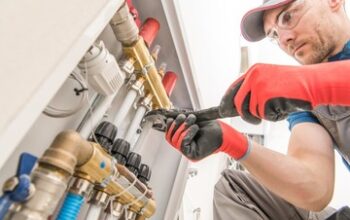Plumber Arvada is essential in ensuring that water flows efficiently in homes and buildings. They work behind the scenes to maintain systems that most people take for granted. From installing pipes to fixing leaks, their expertise keeps daily life running smoothly. Without their skills, basic necessities like clean water and proper drainage would be compromised.
Plumbing systems are more complex than they seem at first glance. A plumber must understand how water pressure, gravity, and pipe materials interact. Fixing leaks or clogs requires knowledge of both the structure of the building and the behavior of water. Even a minor misstep can lead to serious problems like flooding or contamination.
Plumbers are often called in during emergencies when time is critical. A burst pipe or a clogged sewer line can cause significant damage if not addressed quickly. Their ability to assess the problem and implement a solution under pressure is a valuable skill. Quick and accurate repairs prevent further issues and restore normal operations.
Training to become a plumber requires a combination of classroom instruction and hands-on experience. They learn about different pipe materials, fitting techniques, and water distribution systems. Understanding building codes and safety regulations is essential to ensure compliance. A well-trained plumber can anticipate problems and address them before they escalate.
Plumbers also play a role in improving water efficiency. They install modern fixtures that reduce water consumption without sacrificing performance. Leak detection and repair help conserve water and lower utility costs. Their work supports sustainable practices and helps reduce waste.
Advanced technology has introduced new challenges and opportunities in plumbing. Smart home systems now integrate with plumbing networks to monitor water usage and detect leaks. Plumbers must stay updated on these advancements to provide effective service. Their ability to work with modern systems ensures long-term efficiency and reliability.
Proper drainage is essential for maintaining sanitary conditions. Plumbers design and maintain drainage systems that prevent backups and contamination. Poorly designed systems can lead to unpleasant odors and health risks. Ensuring proper drainage protects both property and public health.
Plumbers also handle gas lines and heating systems. Installing and maintaining these systems requires specialized knowledge and safety precautions. Gas leaks can be dangerous, making proper installation and maintenance critical. Their expertise extends beyond water systems to ensure overall safety and comfort.
Commercial and industrial plumbing requires a higher level of complexity. Large-scale systems must handle high water volumes and pressure. Plumbers working on these projects need to coordinate with engineers and other contractors. Their role is critical in ensuring that the entire system functions as intended.
Preventative maintenance is a key part of a plumber’s job. Regular inspections and repairs prevent small issues from turning into major problems. Identifying weak points in the system and addressing them early saves time and money. Scheduled maintenance extends the lifespan of plumbing systems and reduces the risk of failure.
Plumbers often work in difficult and confined spaces. Fixing pipes behind walls or under floors requires physical strength and dexterity. They must also work in various weather conditions, from extreme heat to freezing cold. Their ability to adapt to different environments reflects their commitment to the job.
Customer service is an important part of plumbing work. Plumbers need to explain problems and solutions clearly to clients. Building trust and maintaining professionalism improves customer satisfaction. A plumber who communicates well and completes work efficiently is more likely to be recommended.
Emergency plumbing services are available at all hours, reflecting the importance of this profession. A major leak or a blocked drain can happen at any time. Plumbers who respond quickly and effectively prevent further damage. Their availability ensures that homes and businesses can recover quickly from plumbing issues.
Plumbers also handle water heaters and filtration systems. Installing and repairing these systems improves water quality and comfort. Proper maintenance ensures consistent hot water and clean drinking water. Their expertise helps households and businesses maintain a reliable water supply.
Wastewater management is another critical area where plumbers play a key role. They design and maintain systems that transport wastewater safely away from buildings. Preventing contamination and leaks protects both human health and the environment. Their work ensures that waste is processed and disposed of correctly.
Plumbing inspections are often required for property sales or renovations. A plumber assesses the condition of the pipes, fixtures, and drainage systems. Identifying problems early allows for repairs before they become more costly. Their expertise helps property owners maintain the value of their investment.
Innovations in plumbing materials and techniques have improved efficiency and durability. Flexible piping and corrosion-resistant materials extend the lifespan of plumbing systems. Plumbers must stay informed about new materials and methods to provide the best service. Their ability to adapt to industry changes reflects their dedication to the craft.
Plumbers are also involved in construction projects from the ground up. They work with architects and builders to design plumbing systems that meet the needs of the property. Proper planning ensures that the system is efficient and compliant with regulations. Their input during the design phase prevents costly modifications later.
Cross-connection control is another area where plumbers provide valuable expertise. Preventing the mixing of clean and contaminated water is essential for public health. Backflow prevention devices are installed and maintained to ensure water safety. Proper management of cross-connections protects drinking water quality.
Plumbers face ongoing challenges from aging infrastructure. Replacing old pipes and updating outdated systems requires careful planning and execution. Working around existing structures while minimizing disruption takes skill and experience. Their ability to modernize systems while preserving functionality is highly valuable.
Stormwater management is becoming increasingly important in urban areas. Plumbers design and maintain systems that direct rainwater away from buildings and streets. Proper drainage reduces the risk of flooding and water damage. Their work supports urban development and environmental protection.
The rise of eco-friendly plumbing solutions reflects a growing awareness of environmental issues. Plumbers install low-flow fixtures and water-saving appliances to reduce consumption. Greywater recycling systems and rainwater harvesting further improve efficiency. Their role in promoting sustainable practices benefits both clients and the environment.
Plumbers must also navigate complex permit requirements and inspections. Securing the necessary approvals ensures that the work meets regulatory standards. Managing documentation and meeting deadlines are essential parts of the job. Their ability to handle the administrative side of plumbing work reflects their professionalism.
Professional development is important for plumbers to stay competitive. Attending industry conferences and training sessions keeps them informed about new trends and regulations. Certification and licensing requirements ensure that plumbers maintain high standards. Their commitment to continuous learning strengthens the industry as a whole.
Plumbers often work as independent contractors or as part of larger companies. Managing schedules, clients, and supplies requires strong organizational skills. Balancing multiple projects while maintaining quality and efficiency is a challenge. Their ability to manage business operations alongside technical work reflects their versatility.
Public health relies heavily on the work of plumbers. Safe drinking water, proper sanitation, and effective waste management are essential for community well-being. Their expertise prevents the spread of disease and ensures a healthy living environment. Recognizing the importance of plumbers elevates the value of this profession.
The future of plumbing will likely involve greater integration with smart technology. Automated leak detection, water usage tracking, and remote system control will become more common. Plumbers who adapt to these advancements will provide more efficient and responsive service. Their ability to combine traditional skills with modern technology will define the next generation of plumbing.


